Technology posts
Monday April 15, 2024
IMDb Doesn't Make Eastwood's Day
Can IMDb do anything right anymore? In the early days, without Amazon's money, somehow they made it work, but now, with tons of dough, and (I imagine) layers upon layers of Amazonian management, it's just one pratfall after another. There's obviously the algorithm from hell. That's a daily occurence. And then there's stuff like this.

What is it? That's the bottom portion of Clint Eastwood's acting credits on IMDb, in the usual reverse chronological order. So it's his first acting credits—that early Universal Studios crap he had to do. You know: the sequel to “Creature from the Black Lagoon,” “Tarantula,” “Kelly's Heroes”...
Wait, what? “Kelly's Heroes”? From 1970? As his screen debut? You don't even need to know movies to know that's wrong. You just need to know how to count. I guess IMDb doesn't know how to count.
I tried to alert IMDb to this glitch two weeks ago but nothing's changed.
Tuesday January 30, 2024
Who Watches Watchmen? Not IMDb
Who exactly is running IMDb into the ground? This was a photo on Cord Jefferson's page:
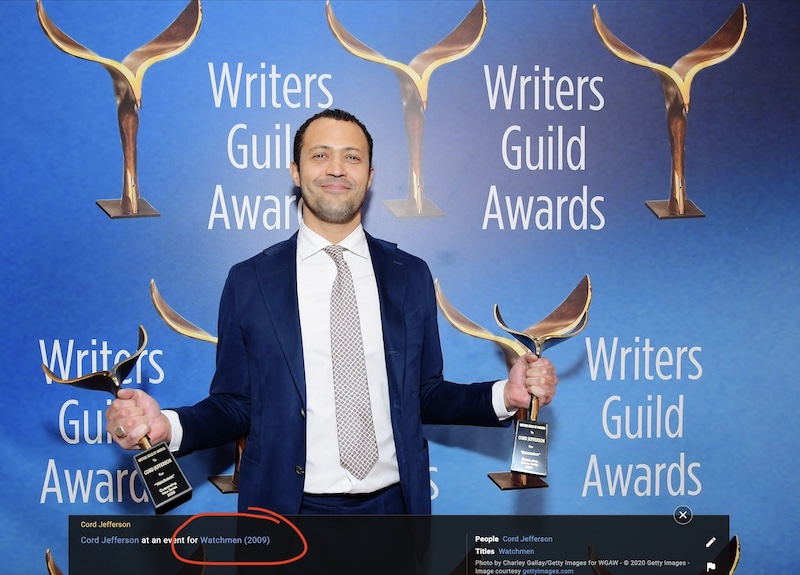
Jefferson is the writer-director of “American Fiction,” starring Jeffrey Wright, and for the past 10 years he's worked on “The Nightly Show with Larry Wilmore” (196 episodes), “Master of None” (10 episodes), and “The Good Place” (25 episodes). All good shows. He also wrote and was executive story editor on “Watchmen,” the great 2019 ur-superhero HBO series that introduced the 1921 Tulsa Race Massacre to most Americans. The photo is him accepting a WGA or two for that work.
And what does IMDb credit him for? The shitty 2009 “Watchmen” that Zack Snyder adapted.
I've seen a lot of these types of mistakes recently: wrong title, wrong link. It's like IMDb has shunted half its shit off to AI, and AI doesn't know between “Watchmen” (2009) and "Watchmen (2019). It's just ... try a little, IMDb. You still have a good thing going. Try a little. Before we all find a hell of a good universe next door.
Wednesday December 13, 2023
LinkedIn: Our Website Sux
A humblebrag is when you seem to be going “Aw, shucks” and you're not. You're stroking your ego. You're beating your chest.
Do we have a 21st century term for what the following does? It was part of a message I received the other day from LinkedIn:

While they're pushing or promoting their product (the app), they're also dissing their product (the website). Is there a term for that yet? And if not, what would you call it? Promodiss? And is there a pre-Internet precedent? It would have to be a product that has multiple ways of consuming or experiencing it, and that's not most products. Hostess couldn't say TWINKIES ARE BETTER IN THE MOUTH!
I'm also getting a slight scolding vibe here. LinkedIn is basically telling me “You're doing it wrong. Do it this way. The way we want you to.” Creepy.
Thursday October 26, 2023
Xs on X's Eyes
Here's the Business Insider headline:
The banks which loaned Elon Musk money to help buy Twitter expect to lose $2 billion on the debt, report says
Key stats:
- Downloads of the app (once Twitter, now X) fell by almost 30% in just three months
- A marketing firm says only two of the world's biggest advertisers advertised on Twitter/X last month
- Fidelity has marked Twitter's valuation down by 2/3
A key graf:
Bankers close to the deal told The Journal that X could be given a junk-bond rating, meaning it is at risk of defaulting on the loans, due to both Musk's controversial management style and a waning ad market.
My farewell post, nearly a year ago:
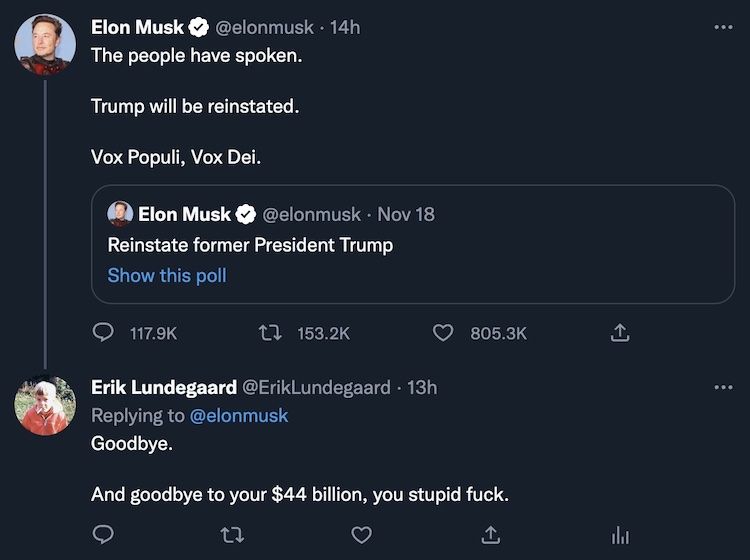
I've said it before: If you had told me to destroy Twitter without anyone knowing I was destroying Twitter, I wouldn't have been able to come up with half the stuff Musk has done in supposed service to the company. So I guess, in a way, he is a genius.
Saturday July 29, 2023
C'mon, Internet
This is HBO Max, so Warner Bros./Discovery:
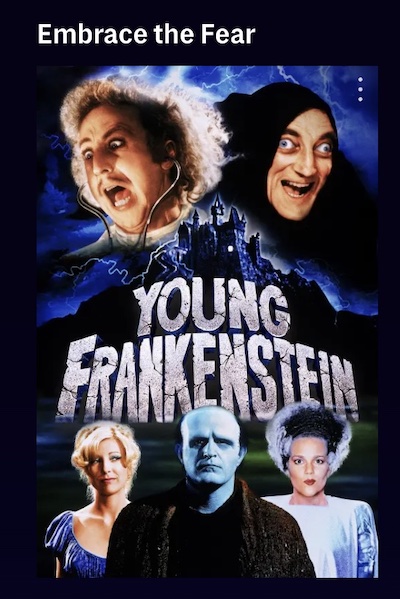
They've since changed that heading to read “A Scary Good Time,” because saying “Embrace the Fear' about one of the best comedies of the 1970s makes you look a little stupid. At least they were only stupid for a few weeks.
Speaking of: This is Google, after a search on ”Bart Starr."

Coach? Starr was a quarterback for 16 years, a coach for eight. As QB, he led the Packers to three NFL championships and the first two Super Bowl titles, won an MVP (1966), and was elected to the Pro Football Hall of Fame in Canton, Ohio in 1977. He became legendary. During his years as a coach, the Packers appeared in the postseason once, losing in the second round to the Dallas Cowboys in the expanded 1982 playoffs. He was a little less than legendary.
It's still there, that designation. Google IDs him as a coach. Because Google. Because the whole damn thing is getting worse.
Embrace the fear.
Friday July 28, 2023
Elon's Brand: Ecch
For a few years during the 1960s, Marvel Comics produced a humor magazine called NOT BRAND ECHH, a title playing off of commercials of the time that pitted a named product (Pepsi-Cola, say) vs. an unnamed product labeled “Brand X.” That was the brand you never wanted: Brand X.
 I thought of it again when hearing about Elon's latest supergenius move: rebranding Twitter as X. Apparently that happened on Sunday.
I thought of it again when hearing about Elon's latest supergenius move: rebranding Twitter as X. Apparently that happened on Sunday.
Per the NY Times:
Inside Twitter's headquarters in San Francisco on Monday, X logos were projected in the cafeteria, while conference rooms were renamed to words with X in them, including “eXposure,” “eXult” and “s3Xy,” according to photos seen by The New York Times. Workers also began removing bird-related paraphernalia, such as a giant blue logo in the cafeteria. Outside the building, workers took off the first six letters of Twitter's name before the San Francisco Police Department stopped them for performing “unauthorized work,” according to an alert sent by the department.
Supposedly this is a first step in making Twitter an everything company like China's WeChat, but it's a stupid, clumsy first step—more of a pratfall, really.
“It's natural to wonder why the world's richest man would spend his time dismantling one of the world's most recognizable social-media brands in favor of an inscrutable super app nobody asked for,” The Atlantic's Charlie Warzel writes midway through his article, “Why Elon Killed the Bird.” Jeff Tiedrich has less patience in his post, “Never Fuck With Your Brand,” writing, “Elon hasn't just fucked with his brand, he's poured gasoline all over his brand and set it the fuck on fire. He's replaced one of the world's most iconic logos with a generic letter of the alphabet—one that thousands of business already use.”
What's a tweet now? An X? Or ex? Or echh?
To coin a phrase: Who says a social media platform has to be good?
Sunday July 16, 2023
Before They Were Famous: Kevin Costner in ... What?
I think I got pulled in to the IMDb slideshow because I didn't recognize the actors and thought, “Well, if this is 'Before They Were Famous,' maybe this will help me figure out who among the kids is famous.” Win win.
Sashe Calle, for example. Here she is on the afternoon soap “The Young and the Restless” before she was famous. So why is she famous now? Ah, she's the new Supergirl in the new “The Flash” movie nobody went to see. Got it. And here's Anson Mount wearing flannel on some 1995 TV somethingorother. And now he's ...? Oh right, he's the new square-jawed Capt. Pike on the new “Star Trek.” Or the new old “Star Trek.”
And then I got to the one on Kevin Costner.

Before he was famous.
Kevin Costner.
In “Dances With Wolves.”
By that point, he'd only starred in “No Way Out,” “The Untouchables” (the fourth-biggest box-office hit of 1987) “Bull Durham” (15th of 1988) and “Field of Dreams” (14th of 1989). I subscribe to newspapers.com, which digitizes and makes searchable hundreds of newspapers from the 19th, 20th and 21st centuries; and in 1989, among the newspapers this website has contracts with, there were 40,113 references to Kevin Costner.
Before he was famous.
Could IMDb get it more wrong? Could IMDb continue to get it more wrong in all of the ways they do? It's like they're gaslighting our cultural history. Costner became more famous after this, sure, and “Dances With Wolves” helped. And so did “The Bodyguard” and Whitney Houston and “I Will Always Love You,” and all that. In 1991, per newspapers.com, he's referenced 80,301 times. So that's twice as famous. He became twice as famous as he was before. But before, he was just one of the most famous actors in Hollywood.
Put another way: It's not like anyone went to “Dances With Wolves” in 1990 and said, “So who's this starring again?” We knew.
IMDb, if you can get a deleted-scene screengrab of him as Alex in “The Big Chill,” yes, that's him before he was famous. You might want to try that.
Monday June 19, 2023
Where's the “Not Ever” Button?

This is increasingly the thing. Corporations are constantly asking you how they're doing but they don't really want to know. It's just data. It's a number, not an explanation. And there's no out. There's just now or later but no never. How are we doing? How are you doing? You were doing OK until you kept asking me how you were doing.
We made a mistake not regulating these assholes.
Saturday June 17, 2023
Amazon Bug Report: An Update
The other day I noticed that Amazon.com fixed one of the many glitches on its site: the 1925 Richard Barthelmess movie “Shore Leave” was now listed as 1925 rather than 1969. Good for it! Someone somewhere was actually paying attention. Or maybe it was an AI fix? I'll take it either way. It made me wonder how they were doing with all the other glitches I've flagged recently.
Turns out, meh:
- Amazon-owned IMDb says you can watch the 1931 George Arliss movie “The Millionaire” on Amazon Prime ... but the link still leads to the 2012 Russian film “The Millionaire.” (First flagged: May 2020)
- Amazon-owned IMDb says you can watch the 1925 Lon Chaney movie “The Monster” on Amazon Prime ... but the link still leads to the 1975 Joan Collins horror flick “The Monster” (First flagged: February 2021)
- Hey, another fix! The 1933 Edward G. Robinson comedy “The Little Giant” no longer says it co-stars Ewan McGregor (born 1971). Wait ... No, sorry. They just no longer list actors and directors on the first page. You have to go into the “Details” section, where, again, the movie stars Edward G. Robinson, Mary Astor, and ... yes, Ewan McGregor (born 1971). Plus in the “Related” section, offering up other films to stream from the principles, they include Astor, supporting players Helen Vinson and Russell Hopton, director Roy Del Ruth, but bupkis on Robinson. (First flagged: August 2021)
I guess one small step for Amazon was just one small step for Amazon.
Thursday March 16, 2023
Check, Please
For years Twitter had a blue checkmark system to verify “name” accounts. Basically it was Twitter telling us that this famous person—Barack Obama, Arnold Schwarzenegger, Meryl Streep—is who they say they are. It's not some parody account or scammer. They're verified. That's why they have a blue checkmark next to their name.
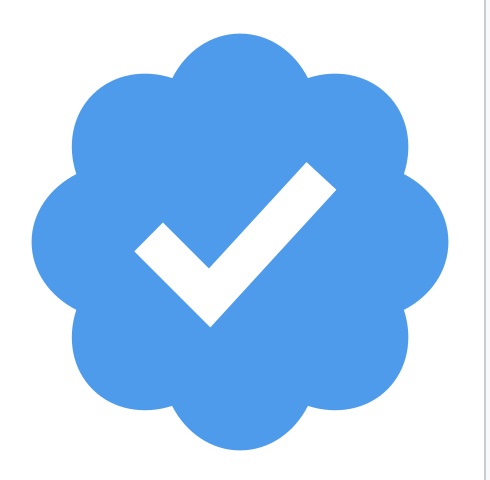 When Elon Musk took over Twitter, he decided this vertification system smacked of elitism rather than common sense and announced that he was charging for the service. His original offer of $20 per month was lowered (during a hilarious real-time Twitter exchange with Stephen King) to $8 a month, but here's the thing: Anybody could buy it. Anybody could be verified. Anybody. Elon's Twitter did zero due diligence on the accounts, just took the money and ran. The checkmark verified nothing. That wasn't the reason I left Twitter but it was happening around the time I left Twitter.
When Elon Musk took over Twitter, he decided this vertification system smacked of elitism rather than common sense and announced that he was charging for the service. His original offer of $20 per month was lowered (during a hilarious real-time Twitter exchange with Stephen King) to $8 a month, but here's the thing: Anybody could buy it. Anybody could be verified. Anybody. Elon's Twitter did zero due diligence on the accounts, just took the money and ran. The checkmark verified nothing. That wasn't the reason I left Twitter but it was happening around the time I left Twitter.
Today, at work, I got the message below from Twitter about our work account.
You've turned off two-factor authentication for [account]
This means you'll no longer have this added protection when you log in to Twitter. Your account will be more vulnerable to compromise. You can turn on two-factor authentication any time in the Account > Security section of your Twitter settings.
I forwarded the message to our social media liasion, who informed me that it relates to the blue checkmark. Now, if you don't pay for the checkmark, you lose this extra layer of security that Twitter's own team put in place (pre-Elon) to protect us all from hackers.
What an absolute shithead this guy is. What a turd. First, he makes the verification system useless while simultaneously charging for it. Then, when not enough people jump, he says if you don't pay for my now-useless verification system we'll make your account “more vulnerable to compromise.” It's penny-ante extortion is what it is. The dude is just begging to be regulated. I hope it happens soon. I hope it leads more people to jump—off the platform. Permanently.
For what it's worth, you can find me on these platforms:
I'm a little bored with both, to be honest, since not enough people I know are on them. It feels like I arrived too early to a party and I'm just standing there with a drink wondering what the fuck. But at least I don't have to deal with the whims of that little turd anymore.
Sunday December 18, 2022
Shore Leave, 1969
In my internet wanderings I came across this film on Amazon Prime. And then I noticed something off. Can you spot it?
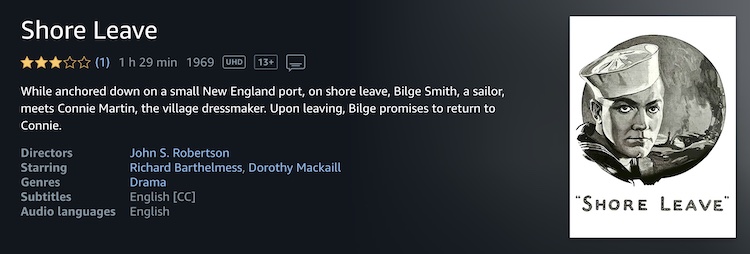
Doesn't the poster look like it's from the silent era rather than—as stated—1969? And isn't Richard Barthelmess an actor from the '20s and '30s? Of course he is. Of course it's a silent film. It's from 1925, not 1969.
Here's the fun part. I've spent the last week trying to get Amazon to correct this error. There's a “feedback” link on each page, so every day for the past week I sent them a note. Some version of: “The year for the movie 'Shore Leave' is incorrectly listed as 1969. It's a silent movie from 1925. Both the director and its director were dead by 1969.” Sometimes I included the link to the page in case they couldn't figure out what I was talking about. They've corrected nothing. Like all of the other mistakes they won't correct. Poor Jeff Bezos must be rolling over in his grave.
UPDATE, JAN. 5, 2023: Still not fixed. And yes, adding the year is indicative of my confidence in Amazon's QA.
UPDATE, JUNE 15, 2023: Fixed!! How about that?
Sunday December 11, 2022
What is Domenick Lombardozzi 'Known For'?
IMDb has a new website design but not a new “Known For” algorithm. They fixed what wasn't broken and kind of broke it. The broken thing they didn't bother with.
Do you know Domenick Lombardozzi? I'll always think of him as Herc in “The Wire” because that's where I saw him most often and most memorably. I was about to say it's where I first saw him but based on his CV that's not true. But it's where I began to go, “Hey, that guy.” It's where I began to know his name.
Not everybody has the trajectory I do, of course. I remember an old girlfriend viewed Ed Hermann differently. I was eight years older, so I saw him and went “Hey, FDR!” (“Eleanor and Frankllin,” 1976-77). She saw him and went “Hey, Head Vampire!” (“The Lost Boys,” 1987). What someone is known for to us often depends on when and in what manner we jumped on board.
That said, I can't imagine many people see Domenick Lombardozzi and go, “Hey, it's the tow-truck driver from 'For Love of the Game'!”
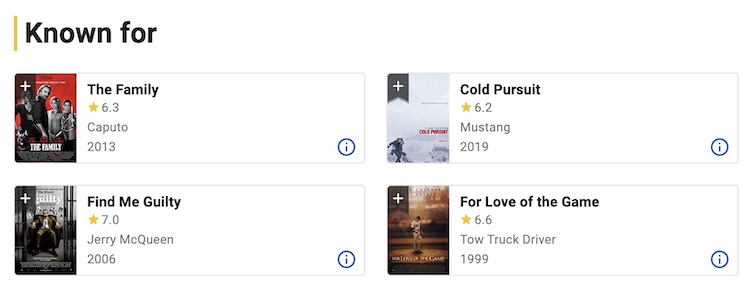
No “Wire,” no “Boardwalk Empire, no ”Rosewood." I know IMDb's algorithm underplays TV series but maybe it should count the number of episodes someone was on? Feels like it might be relevant.
Anyway, thanks for the new shitty website design, guys.
Thursday December 08, 2022
What Kinda Stinks about Mastodon
From David Chen's SubStack piece “How Every Twitter Alternative Kinda Stinks (So Far)”:
The number one thing that stinks about Mastodon is that you have to choose a server to sign up for the service and the process of doing so right now is hopelessly broken. When you go to the page to choose a server, many of them force you to apply for an account and barely any of them seem like they align with general interests. (There are 2 servers for “Furries” but 0 servers for “Film” or “TV”). For this reason alone, I don't think Mastodon will ever be adopted by the masses unless/until a large institutional or corporate backer comes in to bring order to this chaos.
The highlighted is exactly what I found confusing and frustrating when I set up my Mastodon account last month. No film, no baseball, no ... whatevs. What server did I wind up with? I forget. (It wasn't “Furries.”) In fact, I thought I begged off at the last moment, but, no, I do have an email from Mastodon so ...
That's right, it's the CIM one. Or C.IM. Creation Innovation Masturbation or something.
Anyway, I'm there, at this name, if anyone's interested.
Sunday December 04, 2022
Olive Gardenia Hussey

Here's another example, like the Amazon Echo thing, of companies basically saying, “No need to think, human. Our algorithm knows all.” And of course it doesn't know anything.
This time it's Google's search-bar “autocomplete prediction.” Not the autocomplete suggestion based on your past usage. This appears to be: 1) automatic, or autocompleted, without your say-so; and 2) based on nothing to do with you. It's what it thinks you're about to ask.
Here's an example. The other day I got an email from SIFF, our local festival/theater company, that highlighted movies playing this month, including something called “Black Christmas,” with a photo of a woman making a phone call. “Is that Olivia Hussey?” I wondered. So I googled “Olivia Hussey,” but this is what I saw in the search bar when I was done:
Olive Gardenia Hussey
“Sounds like a drag queen,” a friend said when I told him the story.
Essentially I'd gotten as far as “O-L-I-V” and Google assumed I wanted Olive Garden. Even though I've never googled “Olive Garden” in my life. But between the “v” and the “i” Google just went “Here.”
There's supposedly a way to turn off autocomplete predictions, but the steps I followed led to a dead-end for me.
The bigger point is: I don't get why companies think we want them to think for us. Particularly when they're so bad at it.
Oh, and it was Olivia Hussey. “Black Christmas,” 1974, directed by Bob Clark, and starrring Hussey, Margot Kidder, Keir Dullea, John Saxon, and Andrea Martin(!): “During their Christmas break, a group of sorority girls are stalked by a stranger.”
See, was that so hard, Google?
Thursday December 01, 2022
'…And Similar Songs': The New Effed-Up Amazon Echo Programming
I don't think I've ever used the Amazon Echo correctly or efficiently. My wife wanted it, we got it, it sits in the kitchen. Mostly I just ask it to play music or the local NPR station. And if I'm in the kitchen for a short chore—feeding the cat, for example—I might ask it to play a specific song. That way I can walk away and it'll stop on its own.
I did this at the beginning of November but instead of doing so, per normal, Alexa, the voice of Echo, responded, “Shuffling [whatever song I requested], and similar songs.”
And similar songs?
 But I was busy getting ready for a trip to New York so I didn't investigate. And then I got COVID in New York. And now it's a month later.
But I was busy getting ready for a trip to New York so I didn't investigate. And then I got COVID in New York. And now it's a month later.
And Echo is still doing this.
I searched online for a way out but there doesn't appear to be a way out. This product no longer plays the music you ask it to play; it plays the music it wants you to listen to.
And someone at Amazon—enough someones at Amazon—thought this was a good idea.
So what are those similar songs? How good is Amazon's algorithm? I decided to test it out. I went with a fairly obscure song by a not-at-all obscure band: “Why Don't We Do It in the Road?” by the Beatles. And Alexa said: “Shuffling 'Why Don't We Do It in the Road?,' remastered 2009, and similar songs.”
These are those similar songs, in order:
- “Oh, Darling!” by the Beatles (Sure)
- “Don't Stop Believin'” by Journey (Really?)
- “Eye of the Tiger” by Survivor (Oh, come on!)
- “Livin' on a Prayer” by Bon Jovi (What's with the '80s playlist?)
- “We Will Rock You” by Queen (Without Freddie's vocals?)
- “Free Fallin'” by Tom Petty (Why all the g-dropping titles?)
- “All By Myself” by Eric Carmen (OMG)
- “Africa” but Toto (OMFG!)
And that's where I ended the experiment. Not because I wasn't curious if it could get worse than Toto, but because I ran into yet another change to Echo's programming. After saying “Alexa, next,” Alexa told me, or admonished me, thus:
“Only six skips are allowed every 60 minutes.”
And then it went back to playing the song I didn't ask it to play.
Just think what Amazon has done here. They've decided that the user should no longer be in charge of deciding what music they listen to; and if you don't like the choices it gives you, well, too bad.
I suppose I should count my blessings. When the Amazon Echo wouldn't let me skip Toto, at least it let me turn off the Amazon Echo.
For now.
All previous entries
Baseball's Active Leaders, 2023
What Trump Said When About COVID
Recent Reviews
Everything Everywhere All at Once (2022)
Black Panther: Wakanda Forever (2022)
Doctor Strange in the Multiverse of Madness (2022)
Spider-Man: No Way Home (2021)
The Cagneys
A Midsummer Night's Dream (1935)
Something to Sing About (1937)
Angels with Dirty Faces (1938)
A Lion Is In the Streets (1953)
Man of a Thousand Faces (1957)
Never Steal Anything Small (1959)
Shake Hands With the Devil (1959)







